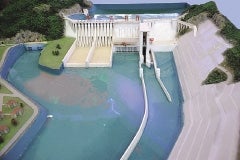Warning energy costs will rise as the state aims to meet the 2020 greenhouse gas emissions reduction goals of its Global Warming Solutions Act, a new policy brief from the Greater Boston Chamber of Commerce describes hydropower as featuring energy reliability and environmental impact “strengths” with “less clear” impacts on costs for ratepayers.
The brief, a copy of which was obtained by the News Service, concludes that the current infrastructure to transmit hydropower from Canada or New York is “inadequate” but says long-term contracts recommended by Gov. Charlie Baker would mitigate financial risks for building the infrastructure needed to bring hydropower sources into Massachusetts.
Baker’s plan to develop clean energy transmission infrastructure guarantees that a minimum amount of power is purchased over a period 15 to 25 years, according to the brief. Through the contracts, the state would guarantee the purchase of 9.45 million megawatts of hydroelectric power per year for one project, the equivalent of about 20 percent of the total electricity consumption in Massachusetts in 2014. At a maximum, the bill allows the state to guarantee twice that amount divided between two projects, the brief says.
“Depending on how the contracts are designed under each proposal, ratepayers could bear the risk of cost overruns on transmission projects,” the brief cautions. “And, as with any long-term contract, there are inherent risks that unanticipated events or technological advances could dramatically change the market.”
But without guaranteed revenues associated with transmission investments “the hurdles to bringing hydropower to Massachusetts are too high,” according to the brief, which notes that if the state does not agree to pursue hydropower it may meet its emissions reduction goals through “costlier” options.
“This is possible either by using other no-/low-emission, but costlier, fuel sources to generate electricity or by requiring greater emission reductions from sectors other than electricity generation, such as transportation,” the brief states.
The brief notes an alternative path to additional clean energy is underway that does not require passage of legislation on Beacon Hill but would need agreement across state lines. Massachusetts, Connecticut and Rhode Island last year jointly issued requests for proposals for renewable energy generation and transmission.
“Based on our analysis of the data included in our energy report, the Chamber will support proposals that encourage the procurement of hydroelectricity in the Commonwealth,” Chamber of Commerce President and CEO James Rooney said in a statement to the News Service. “We believe that hydroelectricity is the most cost-effective energy source for Massachusetts to meet the Green House Gas emission reduction goals set forth in the Global Warming Solutions Act.”
Rooney said the business group has identified “two reservations” with Baker’s bill.
“We caution against legislating a set amount of electricity to be procured from a specific source,” he said. “Instead, we would encourage the Legislature to allow for a competitive procurement process that does not require a minimum amount from a specified energy source. In addition, we encourage the Legislature to provide clarity and measurable parameters to define the term ‘cost effectiveness’ for the ratepayers.”
The brief emphasizes the goals of balancing cost, power reliability and environmental impact concerns in weighing energy policy changes. House leaders have been weighing options for months and plan to release an omnibus energy bill soon that addresses the looming closure of Pilgrim Nuclear Power Station and advances the shift away from fossil fuels and toward offshore wind and hydropower energy sources.
On the cost front, the brief declares that Massachusetts “has some of the highest electricity rates in the country” with commercial ratepayers, who consume one third of the electricity, paying bills that are nearly 20 percent higher than the national average.
“High prices deter industries from locating in Massachusetts and producing more jobs, and are burdensome to residents who make up the state’s workforce,” according to the brief.
The report also warns that increased dependence on natural gas to meet power needs “contributes to unstable costs and reliability concerns,” especially during peak demand periods when demand outpaces supplies.
The brief cautions of cost impacts associated with $4 billion in transmission system investments by 2020, noting that transmission costs have already doubled for New England electricity ratepayers since 2008, from 0.7 cents to 1.5 cents per kilowatt hour.
While transmission investments bolster reliability, the associated guaranteed “return on equity” charges to ratepayers may often run as high as 10 percent or more, according to the policy brief.
State lawmakers have a three-month window ending on July 31 to reach agreement on energy legislation. Under the multi-state clean energy RFP, electric distribution companies are expected to enter into contracts between June 23 and Sept. 22, 2016, according to the brief, but contracts would still need regulatory approval to move forward.

